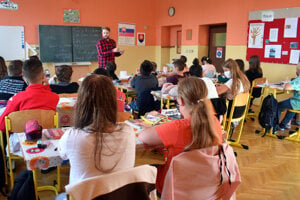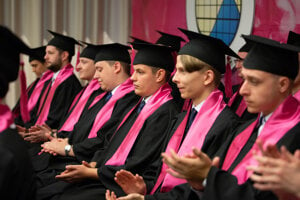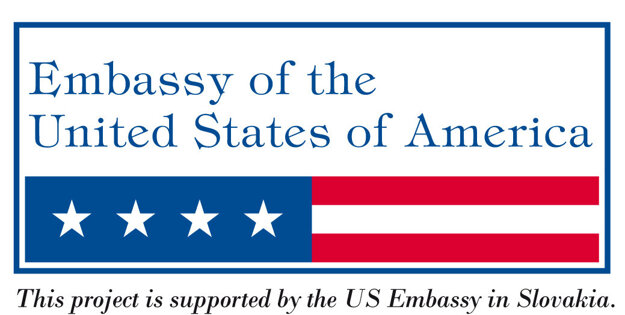A glossary of words is also published online.
When Arnold Kiss joined the Teach for Slovakia initiative in 2015, he expected of the two-year course that he would gain some teaching experience so that he could later help improve Slovak education.
Because of staff shortages, he ended up teaching six different subjects at a primary school in Turňa nad Bodvou, eastern Slovakia, and he was also in charge of students labelled one of the worst-behaved in the school.
“Teachers were reluctant to teach those kids,” he told The Slovak Spectator.
“My goal is to educate young people to be able to select from a wealth of information, make arguments and decisions, and bear the consequences of their decisions.
„
Not only did he teach, but Kiss also tried to fix dysfunctional relationships in the group and work on students’ cognitive skills. “Two brothers, students of bad reputation, eventually showed a talent and interest in IT, so I tried to encourage and support them,” the former teacher recalled. They grew into disciplined and hard-working students, he explained.
Kiss believes schools should teach students soft skills, digital, and entrepreneurial skills, which are widely seen as essential in the 21st century. “They should prepare students for real life,” said Kiss.
The Turňa school, he claimed, was not particularly keen on teaching those skills, but these are the very areas he now focuses on in his part-time position at the National Institute for Education.
“Freedom is useless if schools don’t know how to use it to the benefit of students,” Kiss stressed. He added that schools need more support from the Education Ministry, but also to get practical experience of the labour market.
He does not blame Turňa teachers and the school’s management for the things that did not work well, or not at all, while he was there. “Many of my colleagues were burnt out. The system hurt them,” Kiss said.
 I’m proud of my Roma pupils, a teacher from a Svit school says Read more
I’m proud of my Roma pupils, a teacher from a Svit school says Read more He believes his colleagues did their best “in the manner they were taught”. He gives an example of what he means: “They did not see asking for feedback to get better at their craft as important because they had not been taught to do so during their university studies.”
Learning from feedback is one of the qualities of a good teacher, he believes.
Looking back over the time since his course finished, he said he has noticed improvements in the Slovak education system, including some reduction in bureaucracy.
But support from firms, such as providing work experience, co-operation on projects, and providing computers and other materials, and a clear vision for Slovak education, is still missing, he thinks, adding that while there is the potential to improve the country’s education system under the EU Recovery Plan, he has yet to see “any well communicated vision” about how that could be achieved.
A vision for all schools
Iveta Barková, winner of the ‘Teacher of Slovakia’ award in 2020 and headmistress of a private primary school in Senec, near Bratislava, agrees that a vision for the Slovak education system is a more urgent priority than any material and technical support for it.
“The 21st century should not be characterised by having an interactive whiteboard in each classroom which is then only used as a big screen for presentations,” she said.
“We should build schools that better reflect how much we love our children.
„
The vision for the system should be one that all schools can identify with, she maintained, and that will also give schools, which need more freedom, the opportunity to realise their ideas. It should also respect children’s various needs.
“I would also expect systematic help in educating future teachers and teachers in practice,” she said. When asked what makes a good teacher, she said no teacher should go into the profession as a second choice career, and that he or she must have an open mind towards new things, children, and information.
Barková’s school is currently working on a new curriculum which prioritises encouraging children to take responsibility, engage in civic activities and develop their communication and life skills over the teaching of specific information in individual subjects.
 Schools lack openness and willingness to deviate from the curriculum Read more
Schools lack openness and willingness to deviate from the curriculum Read more “There is a great need for an integrated curriculum, not one where information is taught in isolation, but one in which children are taught to think, form attitudes and solve problems,” Barková emphasised.
She added that many secondary schools have a different priority, putting an emphasis on teaching information and facts, meaning her school’s students often face a sudden change when they go to secondary school.
Schools should reflect how much we love children
At LEAF Academy, a private secondary school in Bratislava, students regularly work on different projects in their own groups or in co-operation with civic associations and other bodies. These projects are related to current social issues and include, for example, initiatives to recycle clothes, or working on the construction of electric cars.
They also organise their own workshops on specific subjects, such as sex education.
The school, whose curriculum does not follow that set out by the Education Ministry, says its mission is to raise young people who will contribute to raising the quality of life in Central Europe.
 His initial bet on an unknown school got him to Canada Read more
His initial bet on an unknown school got him to Canada Read more “What we do is not rocket science,” said Entrepreneurial Leadership teacher Jaromír Sedlár. Slovak schools, private and state, need a vision, people, resources, and innovation of culture to provide excellent education and to ready students, regardless of their social status, for post-education life, he added.
Sedlár agrees that the Education Ministry should give schools more freedom to innovate their processes. The ministry, he said, should ensure at the same time that schools deliver on any required national standards.
He pointed out that various representatives of the Education Ministry, who served there under the previous governments, had written strategies for the education system, but that it would be best if it just set out no more than three accomplishable ideas to be realised – even though this may still be difficult given the different circumstances of every school.
“We should build schools that better reflect how much we love our children,” Sedlár said.
“There is a great need for an integrated curriculum, not one where information is taught in isolation, but one in which children are taught to think, form attitudes and solve problems.
„
To set a good example of a well-functioning organisation, schools should serve not only their students and parents but also their teachers. In turn, schools could then attract the best teachers from the existing talent pool.
Sedlár also emphasised that teachers themselves should be expected to learn from their experience and students, but that “we should not expect perfection”.
But teachers should not do the job of students, he continued. “Students should do as much as possible.”
By adopting this approach, students will acquire the confidence needed to overcome challenges and become people who “are ready to oppose but also to propose,” he said.
Teachers as mentors
Lucia Mitterová, a teacher since 2004, has always seen teaching as a calling rather than a job.
Today she teaches History, Geography and English at a private vocational school in Rimavská Sobota.
“My goal is to educate young people to be able to select from a wealth of information, make arguments and decisions, and bear the consequences of their decisions,” Mitterová said, adding that she tries to be a mentor and an “encouraging friend” to her students.
Critical thinking, soft and digital skills, as well as integrating theory and vocational skills, are all important qualities and capabilities students must possess to succeed, Mitterová believes.
She points to the internships abroad her school offers to both students and teachers as its biggest asset.
 Dual education helps companies achieve top marks Read more
Dual education helps companies achieve top marks Read more “However, for students to acquire these skills, today’s entire education system would have to be changed, and schools would have to be given more freedom,” Mitterová noted. The Covid-19 pandemic has highlighted the rigidity of the current system, she added.
Among the changes she sees as most necessary are related to the content of school-leaving exams, known as Maturita. “The exams should take the form of a ‘project’ in which a student demonstrates the knowledge and skills acquired from studying several subjects, not just one,” she suggested.
Mitterová recently became one of 180 digital coordinators at Slovak secondary schools - a scheme launched by the Education Ministry during the pandemic - to help her school prepare for a digital future.
“You can have the best technology and a super-fast internet connection, but if you don’t use it properly, those things are useless,” she said.
The Spectator College is a programme designed to support the study and teaching of English in Slovakia, as well as to inspire interest in important public issues among young people.







